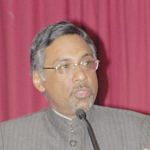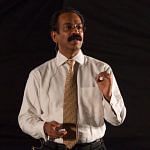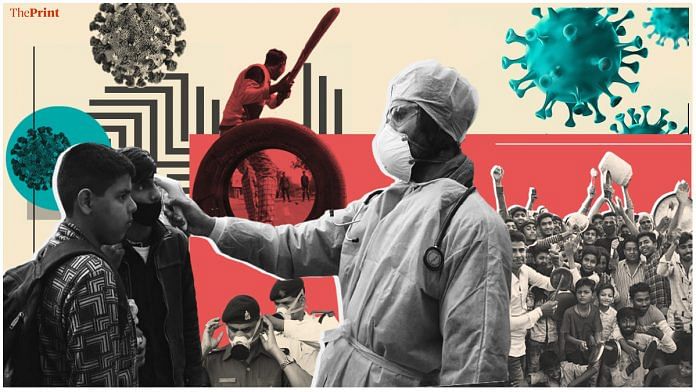As COVID-19 cases increase in India, so have social stigma and boycotts. Prime Minister Narendra Modi’s Janata Curfew was largely successful until Indians stood in groups to clap and clang utensils to support frontline workers, ignoring social distancing advice. Air India crew have complained of boycotts by their neighbours. The Arvind Kejriwal government in Delhi is marking houses of those in quarantine, even as the CM appealed against stigmatisation.
ThePrint asks: How can India counter coronavirus stigma, boycotts and inadequate social distancing?
Counter stigma by emphasising that while coronavirus is very infectious, its effects are mild in most cases
 K. Srinath Reddy
K. Srinath Reddy
President, Public Health Foundation of India
It is extremely unfortunate that stigma is being vacuously and viciously directed at infected persons, their contacts and even Air India flight crew, who have been evacuating Indian citizens abroad. We should counter it by extensive social messaging which emphasises that while the virus is very infectious, its effects are mild in the majority of cases.
Precautions must be taken to keep a safe distance until an infected person fully recovers but after that, the person poses no threat to contacts, just like in the case of the flu. People must be reminded that doctors who know most about this disease do not stigmatise or boycott patients or their contacts. Finally, people may be questioned as to how would they themselves like to be treated if they are affected, as many are likely to be.
Acceptance of and adherence to social distancing must be promoted by explaining the risk to themselves and their family members if they allow the transmission of the virus. To the orthodox, I would say even the planets maintain a safe distance from each other to remain in motion. To the cricket-minded young, I would say that when the play is on, the fielders maintain a distance from each other. Discipline in observing social distancing is a key to our collective survival — that is the message, which must be reiterated.
Views are personal
Coronavirus response must involve an enlightened partnership between the Modi government and the people
 Pavan K Verma
Pavan K Verma
Former diplomat & author, The Great Indian Middle Class
The coronavirus pandemic requires a united stand which must involve the right level of enlightened partnership between the Modi government and the people. Both have assigned and specific responsibilities. The government must provide the right directives to the people, keep them posted with updated information, ensure adequate health infrastructure, increase the level of testing and take measures that prevent the spread of the virus. The people must voluntarily and where necessary, by specific instructions, cooperate with the government.
In this process, however, we need to remember that whatever measures we take, the huge economic and social discrepancies of India must also be taken into account. The measures should cater to all classes of society. For instance, while social isolation and distancing is the right step, for how many days can people, who are daily wage earners or who must go out and work in order to eat at night, remain confined to their homes. Therefore, the government must take such measures that specifically include better health infrastructure with the help of private-sector partnerships and economic welfare measures that reduce the burden on the common man.
There is also a great deal of misinformation proliferating with regard to COVID-19. People must not panic. They must not stigmatise, especially those who are corona warriors, who are waging the battle to contain the disease in different ways. This can only come about when the government conveys the right message to the people on their response.
Maintain physical distance, but use technology to strengthen social connections
 Biju Dominic
Biju Dominic
CEO of Final Mile Consulting (a Behaviour Science and Design Consultancy)
The medical fraternity still knows very little about the coronavirus. So far, no cure has been discovered for it. Everyone knows that our existing health care facilities are inadequate to deal with a massive outbreak of this virus. Healthcare professionals have discovered that reducing all chances of physical contact with others and maintaining physical distance between people is the best way to slow down the spread of coronavirus.
We are fundamentally social animals. In uncertain times like these, the emotional impact of being lonely can carry a heavy psychological price tag. So, during these difficult times, one should make extra effort to reach out to our social connections through phone and social media and derive as much emotional support from such remote social interactions.
There are the healthcare workers who work tirelessly, the airline staff who bring home those stranded around the world, the milk delivery boy who makes sure our morning coffee is not interrupted. They are all doing their job, putting their lives in danger. Don’t forget to show your support for them.
Maintain physical distance. Strengthen social connections.
Stigma arises due to ineffective communication. Govt should educate people on the importance of isolation
 Sujata Mody
Sujata Mody
National Secretary, New Trade Union Initiative
I think it’s too early to talk about stigma and the question of identifying and tracking people who have coronavirus. It’s a highly communicable disease and transfers very quickly. Unfortunately we look at the wrong side of things: even the idea of clanging thalis. I don’t understand how effective these things are. People aren’t realising the importance of social distancing.
The primary intention should be to make people understand the importance of self-isolation otherwise we will move to stage 3, like other countries. Our health preparedness is minimal. The stigma is present because the government is not effectively communicating the need to quarantine and self-isolate.
The authorities are not explaining to people that they need to quarantine themselves. The Modi government should educate the masses about the disease, the protocol and how one can report it.
I don’t think authorities should file FIRs against those identifying themselves as coronavirus positive, as they did in the case of singer Kanika Kapoor. This may deter people from informing, and create distrust and stigma. Instead, we should honour/ commend those such as Air India employees for the great work they are doing. The Kerala government has reached out to the people, and made it a collective fight against the COVID-19. It’s something to emulate.
Modi govt needs to occupy collective mind of India to counter stigma and enforce social distancing
 Vimal Balasubramaniam
Vimal Balasubramaniam
Assistant Professor, School of Economics and Finance, Queen Mary University of London
Most of us have no choice but to be social. We live in confined spaces and even the simplest of tasks such as access to water, force social interaction. To enforce social distancing, we require a combination of law enforcement, solutions to everyday tasks and behavioural nudges that occupy the mind.
To start, create a compelling national narrative not based on fear, or an individual, but on giving hard-working scientists time to figure out a solution to the problem. The narrative needs to be rooted in simple facts, and stories on medical and essential services personnel battling the virus. Make airline crews and medical personnel on the line of fire heroes, not villains. Enlist movie, sports, music, and religious personalities to create a positive social movement of staying put in one place. Clapping one evening does not create this narrative, regular stories of heroism do.
Ease panic and occupy the collective mind of the nation. Provide concrete suggestions to handle financial and logistical concerns of the people. Create contests (e.g., #iononmiannoio in Italy) to ensure the young adhere to social distancing, and leverage radio networks for competitions. Reward them. Provide solutions for social distancing and yet carry out daily tasks in crowded neighbourhoods. Create a repository of solutions, share them, and reward good behaviour.
Lastly, enforce public orders more stringently than ever. Jails are not the solution, but hefty fines that cripple individuals are. But, the stick won’t work without the other measures, especially if we are in this new world for some time to come.
Also read: Janata curfew: Brilliant nudge or Modi should’ve assured more about India’s preparedness?
By Unnati Sharma, journalist, ThePrint




Social distancing is exceedingly difficult in our country. Consider the number of people who typically stay in a small, one room tenement in urban India. Shared toilets, limited water supply. God should keep all Indians safe.